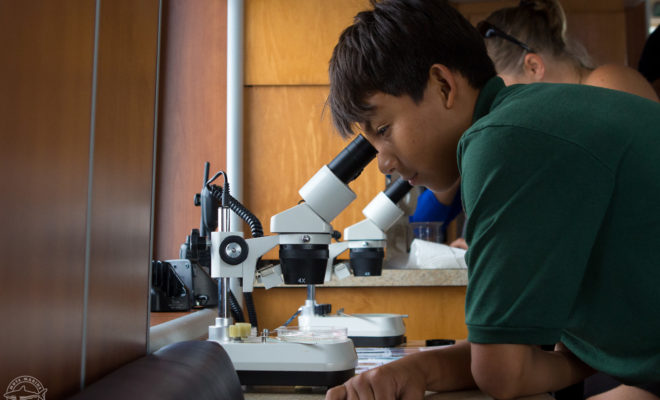
Education
Education Matters
By Ryan G. Van Cleave
One of the goals of Mote Marine Laboratory’s Education Program, says Community Engagement Coordinator Elaina Todd, is to share what they’re doing with the community beyond the boundaries of their 10.5-acre base campus and aquarium out on Ken Thompson Parkway that 200 staff members, including 30 Ph.D. scientists, call home. At Mote, they believe that conservation begins with education, and with their many programs, people are able to “dive in and get your feet wet and your hearts inspired.”
Thanks to the efforts of Dr. Eugenie Clark and the initial philanthropy of Anne and William Vanderbilt as well as William R. Mote and many others, they’ve come a long way since it all began as a tiny one-room building back in 1955. They’ve now got field stations and public exhibits throughout Sarasota County, the Keys, and Boca Grande. As Todd says, “We want to bring Mote to people who haven’t had an opportunity to experience what we do and learn about our research.” To that end, they work with a host of local schools, after school programs, and community partners to better reach underserved populations. “From guppies to adults,” she explains.
While the primary target demographic is K-12, they also offer some early childhood education and adult education with an emphasis on adults with special needs. This past year alone, Mote’s Education Program engaged with close to 10,000 participants. Many of those come from supplemental STEM programming with existing organizations, such as Boys & Girls Clubs in both Sarasota and Manatee counties, Girls Inc, Just for Girls, AMIkids, and numerous YMCA locations.
One particularly successful partnership is at the Robert L. Taylor Community Complex, where they work with—among other groups—HARD:NOC, a unique teen program that invites 13-15 year olds to participate in an 8-month comprehensive program where they receive mentoring, academic support, life skills training and more. Since 2015, Mote has been helping programs like this at the community complex get first-rate STEM education. “A lot of the kids we’ve seen there keep coming back,” says Todd. “They remember what we’ve taught before. They retain it because it’s fun and exciting.”
Mote works directly with schools, too, such as the Triad Alternative School, which is part of the YMCA in Sarasota.It’s a place where kids who haven’t been successful in traditional schools can get back on track with their education. As part of their science curriculum, a group of students comes out to Mote each month for a guided tour, where they engage in a lab activity or help with field sampling.
One of the challenges of serving so many different populations and meeting their various needs is that Todd and the rest of the Mote education team want there to be personalization with each partner. The cookie-cutter this-is-what-you-get approach isn’t the goal here. The Mote team has found that it’s not what makes learning fun or memorable. “We strive to reach out to students wherever they are and help make science matter.” Keeping it fresh, real, and relevant isn’t always easy when you have 40+ different locations to work with, but passion and philanthropic support make it possible.
When Todd started working at Mote three years ago, she more or less had to run the Community Engagement Program by herself (along with volunteer assistance). These days, she has the help of two full-timers, Kayla Keyes and Alison Goldy, and the way things are trending, they’ll need more help in 2018 in addition to the valuable efforts of an incredible volunteer support staff. Together, Todd and her colleagues do weekend onsite work, evening events, and regular-business-hours programs as well. “It’s a crazy schedule sometimes,” Todd admits, “but it’s worth it. The kids are so enthusiastic.”
While Todd has been involved in environmental education since 2004, she’s surprised and pleased by how the spirit of collaboration seems to be everywhere in Sarasota. Organizations are happy to recommend other groups for Mote to work with, and they help, too, with networking. “They’re all so easy to work with. They’re willing to try new things—it makes starting partnerships far easier than it might otherwise be,” says Todd.
The result of those efforts? They’ve pretty much got a science education opportunity for anyone. Want a camp? They’ve got Winter Break, Spring Break, and Summer camps. Want something for the wee ones? The Mommy & Me program. How about something for the homeschool kids? They’ve got Homeschool Days @ Mote twice a month for ages 6-13 and an advanced version for students age 9-16. Want something just for girls? There’s Gills Club, which harnesses girls’ passion for sharks, nature, and the environment by giving them the opportunity to engage in projects focused on making a significant impact on the way sharks are perceived by the public.
Want to be part of all this? There’s always room for Community Engagement volunteers as well as with Mote in general. Plus, there’s a robust, hands-on internship program for college students. For those who complete that internship, the opportunity exists for another year-long program that allows students to conduct scientific research alongside a Mote research staff member.
Quite simply, Mote is where science education matters. And as it says in their Vision Statement: “Over the decades since Mote was created, the world has learned many things about its ocean. One lesson has remained constant: there is still much to discover.”
FOR MORE INFORMATION
on Mote Marine Laboratory’s Community Engagement Programs, please visit
mote.org/education, call 941.388.4441 ext 348, or email educate@mote.org.



You must be logged in to post a comment Login